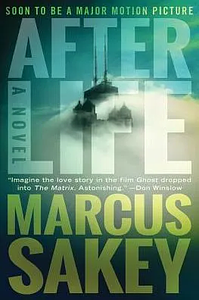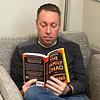Take a photo of a barcode or cover
Interesting concept for a story but parts of the execution were a bit off. There were a lot of ebbs and flows in the book that ended on a valley instead of a peak. Not bad...Nor great.
Afterlife beschäftigt sich mit dem Leben danach verpackt in einen Thriller um die FBI-Agenten Claire und Brody. Beide sterben im Einsatz und lachen...ja wo eigentlich? Die Idee (Leben danach) ist nicht neu, wurde aber für mich hier neu umgesetzt. Zu Beginn hatte ich ein paar Einstiegsprobleme. Dies lag vorrangig am Wechsel der Perspektive. Grundsätzlich mag ich diese Art der Perspektivenwechsel aber hier ist es so abrupt, dass ich oftmals den Anschluss verlor. Als sich dies ab zirka der Hälfte gelegt hatte, hatte ich richtig Spaß. Am Ende habe ich mich mit einem lachenden und einem weinenden Auge von der Geschichte und den Charakteren verabschiedet. Action mit sympathischen Charakteren in einer Welt neben einer Welt. Tot oder doch nicht tot. Zum Sprecher, Oliver Wronka kann ich nur sagen, dass er einen guten Job gemacht hat. Flüssig, mit passenden Stimmnuancen zu den diversen Charakteren. Ich empfehle das (Hör-)Buch gerne weiter aber hört euch unbedingt vorher die Hörprobe an oder lest eine Leseprobe, wenn ihr das Buch bevorzugen solltet.
adventurous
dark
emotional
funny
hopeful
mysterious
First appeared at http://www.thenewdorkreviewofbooks.com/2017/07/afterlife-mythological-battle-of-good.html
No two ways about it: Marcus Sakey's new novel, Afterlife, is ambitious. Even though it clocks in at only about 300 pages, it has elements of several recognizable creative triumphs: The movie Inception, Stephen King's Dark Tower series, Gaiman's American Gods, and Nelson DeMille's best police thrillers, for starters. Hell, there's even a love story here. Perhaps this is why Sakey admits in the acknowledgments, "This one was a beast." Sakey spent "nearly a decade" with this novel, writing and rewriting, fleshing out ideas, and solving problems.
The result is a polished, compelling, inventive "alt-fic" (a genre Sakey just invented) novel that's by turns smart as hell and as shocking as they come. This was a novel I had to put down several times in astonishment, take a deep breath, and then keep reading. It's really mesmerizing in spots — Sakey gets pacing just right here, which is no small feat given the relative complexity (especially in the last third of the novel), the characters, and just how all this fits together.
Here is what happens: Will Brody is an FBI agent chasing a serial killer in Chicago who gets his jollies sniping innocent victims at gas stations and grocery stories. Acting on a tip, Brody is searching for clues in an abandoned church, when it blows up. He's dead. This happens on page 38 — a risky decision for any novelist to kill a main character so early. (Not a spoiler: This is on the back blurb.)
His boss and erstwhile secret lover, the ultra-competent director of the FBI's Chicago office, Claire McCoy, vows to find the killer(s). And while doing so, she also must mourn in secret because no one knows she and Brody were together.
Meanwhile, Brody wakes up. Sort of. He's in a place he comes to understand is an "echo" of real-life — an afterlife that resembles real life in many ways, but has many glaring differences as well.
In this afterlife, there's a choice, just as there is when you're alive: You can choose to be good, and help other people. Or you can choose to be evil, and live only for selfishness. In the opening pages of the novel, we actually get a glimpse of what this evil looks like. And it's terrifying. So Brody soon finds himself stuck in this mythological battle of good vs evil in the afterlife. That's all you need to know plot-wise to get you started. What happens with Claire and Brody's cross-dimension love story? How does Brody fight this mythological and powerful evil? Read it, man. It's worth the trip!
One of the things I loved about this novel is Sakey's vision of how the afterlife works. I got to sit down and talk with him about it a few weeks ago as I worked on a piece for the Chicago Review of Books, and Sakey told me the sort of spark for the novel was how we're so sure that there is going to be an answer for what happens when we die. So what happens if there's either not an answer, or the answer is completely unexpected? Sakey's afterlife has some very specific rules in how it behaves and how its occupants can behave in it — and spelling these out had the potential to bog down what is otherwise an extremely fast-moving story. But Sakey describes these "rules" quickly and clearly and moves on. It's a definite strength of the novel.
Another strength here is dialogue — Sakey is funny. Sakey is cool. And after talking with him for an hour, it's apparent how much of his personality comes out on these pages in dialogue. He mentioned that to him the patron saint of dialogue is Aaron Sorkin, and you can see that influence here. Dialogue is quick, snappy, sharp, and often really funny.
This is one of my favorite novels of the year — I really enjoyed it, both for sheer entertainment, but also for its inventiveness. I had a blast with book. Highly recommended!
No two ways about it: Marcus Sakey's new novel, Afterlife, is ambitious. Even though it clocks in at only about 300 pages, it has elements of several recognizable creative triumphs: The movie Inception, Stephen King's Dark Tower series, Gaiman's American Gods, and Nelson DeMille's best police thrillers, for starters. Hell, there's even a love story here. Perhaps this is why Sakey admits in the acknowledgments, "This one was a beast." Sakey spent "nearly a decade" with this novel, writing and rewriting, fleshing out ideas, and solving problems.
The result is a polished, compelling, inventive "alt-fic" (a genre Sakey just invented) novel that's by turns smart as hell and as shocking as they come. This was a novel I had to put down several times in astonishment, take a deep breath, and then keep reading. It's really mesmerizing in spots — Sakey gets pacing just right here, which is no small feat given the relative complexity (especially in the last third of the novel), the characters, and just how all this fits together.
Here is what happens: Will Brody is an FBI agent chasing a serial killer in Chicago who gets his jollies sniping innocent victims at gas stations and grocery stories. Acting on a tip, Brody is searching for clues in an abandoned church, when it blows up. He's dead. This happens on page 38 — a risky decision for any novelist to kill a main character so early. (Not a spoiler: This is on the back blurb.)
His boss and erstwhile secret lover, the ultra-competent director of the FBI's Chicago office, Claire McCoy, vows to find the killer(s). And while doing so, she also must mourn in secret because no one knows she and Brody were together.
Meanwhile, Brody wakes up. Sort of. He's in a place he comes to understand is an "echo" of real-life — an afterlife that resembles real life in many ways, but has many glaring differences as well.
In this afterlife, there's a choice, just as there is when you're alive: You can choose to be good, and help other people. Or you can choose to be evil, and live only for selfishness. In the opening pages of the novel, we actually get a glimpse of what this evil looks like. And it's terrifying. So Brody soon finds himself stuck in this mythological battle of good vs evil in the afterlife. That's all you need to know plot-wise to get you started. What happens with Claire and Brody's cross-dimension love story? How does Brody fight this mythological and powerful evil? Read it, man. It's worth the trip!
One of the things I loved about this novel is Sakey's vision of how the afterlife works. I got to sit down and talk with him about it a few weeks ago as I worked on a piece for the Chicago Review of Books, and Sakey told me the sort of spark for the novel was how we're so sure that there is going to be an answer for what happens when we die. So what happens if there's either not an answer, or the answer is completely unexpected? Sakey's afterlife has some very specific rules in how it behaves and how its occupants can behave in it — and spelling these out had the potential to bog down what is otherwise an extremely fast-moving story. But Sakey describes these "rules" quickly and clearly and moves on. It's a definite strength of the novel.
Another strength here is dialogue — Sakey is funny. Sakey is cool. And after talking with him for an hour, it's apparent how much of his personality comes out on these pages in dialogue. He mentioned that to him the patron saint of dialogue is Aaron Sorkin, and you can see that influence here. Dialogue is quick, snappy, sharp, and often really funny.
This is one of my favorite novels of the year — I really enjoyed it, both for sheer entertainment, but also for its inventiveness. I had a blast with book. Highly recommended!
Started strong and quickly got better. Familiar without falling into too many tropes. I liked the take on the afterlife and things were moving steadily along until . That was the record scratch moment in the story. Interactions at the police station were far too easy. The black limo was eye-roll-inducing.
The story after that point rang hollow. You build up credibility and this world and then it's dashed in an instant. It's getting 3/4 of the way through a story arc and having some omnipotent narrator comment, "Ah! It was all a dream!" Everything that came after was tasteless and without substance. The story never righted itself -- not because the writing was poor, but because it didn't follow the prescribed rules for the world it established. Bait and switch never makes for a good story.
Spoiler
Will came back from the dead and we meet the white haired womanThe story after that point rang hollow. You build up credibility and this world and then it's dashed in an instant. It's getting 3/4 of the way through a story arc and having some omnipotent narrator comment, "Ah! It was all a dream!" Everything that came after was tasteless and without substance. The story never righted itself -- not because the writing was poor, but because it didn't follow the prescribed rules for the world it established. Bait and switch never makes for a good story.
A compelling read
I enjoyed this one. It was a quick read, I got through it in one sittting because I couldn't put it down. The main characters are well drawn and Sakey's version of the afterlife is intriguing. I'll be thinking about this one for a while.
I enjoyed this one. It was a quick read, I got through it in one sittting because I couldn't put it down. The main characters are well drawn and Sakey's version of the afterlife is intriguing. I'll be thinking about this one for a while.
GOD! WHAT DID I JUST READ! THIS WAS SO GOOD!
I don't know how to start this review. I don't know how I would be able to justify writing this review. Am I even worthy enough to review a book of such calibre?
Afterlife is one of those rare gems which come by only once in a lifetime. This book has opened up my mind, both literally and metaphorically. After a long time, I have been so invested in a book. The words and writing were poetry - I could feel the author taking his time, choosing the right words, and putting in the effort to write this book. The characters - Will, Claire, and others - felt so real. The relationship between Will and Claire was so pure, I could feel their love in me. Worth mentioning is Edmund, who starts off the book that with a bang. Edmund was unworldly. This book was unworldly! It was shocking, overwhelming, unbelievable. At every quarter a goal would be accomplished and I would be like - Now what? Then the author will bring out another twist from his magic hat and blow me away. This book created fireworks in my brain, I could feel it expand with all the amazing happenings. The plot is mind-blowing, mind-boggling, mind-bending. This beast of a book was a feast for my mind. This book had elements of The Matrix, Ghost, Inception and Titanic. This book is a thriller, romance, fantasy, science fiction, and supernatural, all in one. I was wonderstruck by the end of the book. Also, I cried happy tears - the third time I ever cried for a book (first two being - Kane and Abel and All the Light We Cannot See). This book actually stupefied me and I am still in its trance.
Afterlife by Marcus Sakey deserves all the stars in the universe. But since I have only 5 with me, I'll give them all.
For more reviews please visit www.rubinareads.com
I don't know how to start this review. I don't know how I would be able to justify writing this review. Am I even worthy enough to review a book of such calibre?
Afterlife is one of those rare gems which come by only once in a lifetime. This book has opened up my mind, both literally and metaphorically. After a long time, I have been so invested in a book. The words and writing were poetry - I could feel the author taking his time, choosing the right words, and putting in the effort to write this book. The characters - Will, Claire, and others - felt so real. The relationship between Will and Claire was so pure, I could feel their love in me. Worth mentioning is Edmund, who starts off the book that with a bang. Edmund was unworldly. This book was unworldly! It was shocking, overwhelming, unbelievable. At every quarter a goal would be accomplished and I would be like - Now what? Then the author will bring out another twist from his magic hat and blow me away. This book created fireworks in my brain, I could feel it expand with all the amazing happenings. The plot is mind-blowing, mind-boggling, mind-bending. This beast of a book was a feast for my mind. This book had elements of The Matrix, Ghost, Inception and Titanic. This book is a thriller, romance, fantasy, science fiction, and supernatural, all in one. I was wonderstruck by the end of the book. Also, I cried happy tears - the third time I ever cried for a book (first two being - Kane and Abel and All the Light We Cannot See). This book actually stupefied me and I am still in its trance.
Afterlife by Marcus Sakey deserves all the stars in the universe. But since I have only 5 with me, I'll give them all.
For more reviews please visit www.rubinareads.com
A great premise, but it lacked cohesion and went more than a little off the rails. I also can't understand why a book set in Chicago is read by a narrator with a British accent. It was a little distracting.
Cool premise, gets increasingly stupid as it goes along.
Layers
This book takes you on a journey through layers of the universe. Well worth a read. I'm curious about how this will play on the big screen.
This book takes you on a journey through layers of the universe. Well worth a read. I'm curious about how this will play on the big screen.






